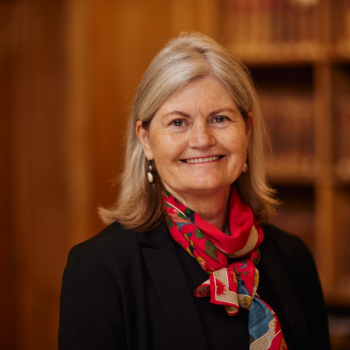Rights of Nature: A moral or a legal-political concept?
Professor Patricia Wiater, Chair for Public Law, Public International Law and Human Rights at the University of Erlangen-Nürnberg, Germany
Dr Guilia Sajeva, Researcher in Political Philosophy at the Department of Cultures and Society of the Università degli Studi di Palermo
Notes & Changes
A recording of this event is available here: https://www.youtube.com/watch?v=gd3vCfueiOQ&list=PLwj4-Geqxth_ww5LTXKFgsc0Vj0VK-CeK&index=4
Human beings are not the only subjects who can seek protection under international human rights law. In an Advisory Opinion from 2017 and in a judgment rendered in 2020, the Inter-American Court of Human Rights indicated to include ‘Rights of Nature’ into the Inter-American system of human rights protection. The Court found that the human right to a healthy environment protects ‘as an autonomous right […] components of the environment, such as forests, rivers and seas, as legal interests in themselves, even in the absence of the certainty or evidence of a risk to individuals.’
This judicial practice mirrors a post-humanised view of rights bearers in human rights instruments. Components of the environment are obviously not human beings but nevertheless protectable in the realm of international human rights law. What type of rights bearers can ecosystems – including trees, oceans, animals, mountains – be? Are they of moral relevance as human beings are? If so, would this lead to acknowledging that they hold moral human rights? Proponents of Rights of Nature see an important commonality between human beings and nature: Stating that nature has ‘intrinsic value’ justifies nature’s moral considerability. It leads to acknowledging it as a subject of independent rights. In this ‘biocentric approach’, nature is seen as an ‘integral ecological partner’ with its own rights to exist and thrive.
In the talk, Patricia Wiater discusses if non-human subjects such as nature can hold moral human rights by referring to philosophical theories on human rights as moral rights. She thereby contrasts moral human rights with international legal human rights understood as a legal-political concept.
Speaker: Professor Patricia Wiater

Patricia Wiater holds the Chair for Public Law, Public International Law and Human Rights at the University of Erlangen-Nürnberg, Germany, and is a member of the Centre for Human Rights Erlangen-Nürnberg. She holds a French-German doctorate in Law with a thesis on European Human Rights Law and Cultural Pluralism from the University of Strasbourg and the University of Leipzig and a doctorate in Political Sciences from the University of Freiburg.
In her Habilitation thesis (Internationale Individualkläger), completed at LMU Munich, she dealt with the procedural role and function private litigants have in international economic law. She took a comparative law perspective on regional economic integration, international investment law and the law of the sea. The outcomes of her analysis drew Patricia’s attention to the subject status of private business entities in international law and to their hybrid status as human rights holders and addressees of human rights obligations.
In her current research, she deals with the overall phenomenon of human rights governance of non-human subjects (corporations, nature, animals, AI).
Chair: Professor Kate O'Regan

Professor Kate O’Regan is the inaugural Director of the Bonavero Institute of Human Rights and a former judge of the South African Constitutional Court (1994–2009). In the mid-1980s she practiced as a lawyer in Johannesburg in a variety of fields, but especially labour law and land law, representing many of the emerging trade unions and their members, as well as communities threatened with eviction under apartheid land laws.
In 1990, she joined the Faculty of Law at the University of Cape Town where she taught a range of courses including race, gender and the law, labour law, civil procedure and evidence.
Since her fifteen-year term at the South African Constitutional Court ended in 2009, she has amongst other things served as an ad hoc judge of the Supreme Court of Namibia (2010–2016), Chairperson of the Khayelitsha Commission of Inquiry into allegations of police inefficiency and a breakdown in trust between the police and the community of Khayelitsha (2012–2014), and as a member of the boards or advisory bodies of many NGOs working in the fields of democracy, the rule of law, human rights and equality.
Discussant: Dr Giulia Saveja
Giulia Sajeva is researcher in Political Philosophy at the Department of Cultures and Society of the Università degli Studi di Palermo. She is currently working on the project Food Sovereignty and Sustainable Development in Sicily. Small-scale and artisanal fisheries and the rights of local communities that focuses on the rights of small-scale and artisanal fishing communities, with particular attention to Sicily and other Mediterranean areas.
Giulia was previously a Marie Skłodowska Curie Individual Fellow at the Strathclyde Centre for Environmental Law and Governance with a project on Rights for Ecosystem Services: a framework to protect the environment and sustainable local communities in the EU aimed at developing an innovative theoretical and legal framework – labelled Rights for Ecosystems Services (RES) – to guide policy and legal developments towards reducing the risk of local communities abandoning their sustainable practices due to the lack of effective protection.
Giulia holds a PhD in human rights from the Law Department of the Università degli Studi di Palermo for which she researched the biocultural rights of indigenous peoples and local communities. On this topic, she published her monograph When Rights Embrace Responsibilities. Biocultural Rights and the Conservation of Environment with Oxford University Press.

